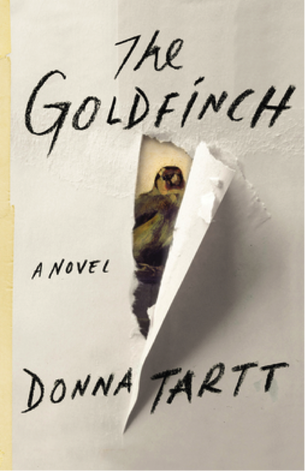
Title: The Goldfinch
Author: Donna Tartt
Genre: Fiction
# Pages: 771
Date Published: October 22, 2013
5-Star Rating: 3
Would you recommend it?: No
I picked up this book over the summer, excited to read Tartt’s newest Pulitzer Prize-winning novel and undaunted by the book’s tremendous length. Expecting it to be a fantastic work of fiction, I thought it would only take a couple weeks to get through its 771 pages. However, after three long months of summer, I found myself only barely past the first 400 pages, utterly disappointed in The Goldfinch’s inability to hold my attention.
This book, Tartt’s first novel in 11 years, begins on a strong note with Theo Decker’s account of the day his mother died. Her death, the result of an act of terrorism at the Metropolitan Museum of Art in New York City where the two live, is what spurs young Theo into a life of thievery and deceit. At the advice of a dying old man in the smoldering museum, he takes the painting “The Goldfinch” and escapes from the building. Despite warrants for the painting, Theo does not return it, and instead embarks on a journey, alternating between the custody of the family of a wealthy friend and his sleazy father in Las Vegas. While the depictions of the protagonist’s early teenage years are fascinating, Tartt spends the majority of the first 400 pages indulging in adolescent clichés and exaggerations based on unlikely premises. After spending some corrupting years in Las Vegas living with his father and beginning a life of dependence on alcohol and drugs, Theo returns to New York to reconnect with the business partner of the old man from the museum.
Upon Theo’s return to the East Coast, the book takes a real turn—Tartt jumps ahead about seven years with no explanation of the character’s most formative years, from fourteen to twenty. All of a sudden we are plunged into the life of a much different Theo Decker than the boy we left behind, weighed down by the burden of the painting. From this point on, the book is completely unrecognizable from the first half, and it is difficult to reconcile the disparate plots and characters. While Tartt excels in creating beautiful images and maintaining a voice that is uniquely Theo’s, she fails to create a cohesive plot that keeps readers engaged. She squeezes in only rare moments of action between pages of detail and difficult-to-follow tangents, and finally sums up the entire story in 50 pages. One can recognize her skill in manipulating language and story, but those talents are lost in this confusing and unrealistic novel.
Review by Anna Olcott '17

 RSS Feed
RSS Feed
